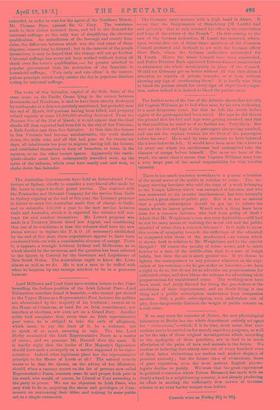There is too much tendency nowadays to a general relaxation
of the moral nerve of the public in relation to crime.. The un- happy starving barrister who sold the copy of a work belonging to the Temple Library which was entrusted to his care, and who was sentenced to six months' imprisonment, has very naturally received a great share of public pity. But it is not so natural that a public subscription should be got up to relieve his wants when he leaves prison. Would such a thing have been done for a common labourer who had been guilty of theft ? Admit that Mr. Weightmau's case was very deplorable,—still had he not far more means of realising the moral evil and the public mischief of crime than a common labourer ? Is it right to show this excess of sympathy towards the sufferings of the educated as compared with those of the uneducated, —an excess which is shown. both in relation to Mr. Weightman and to the convict Roupell? Of course the penalty of crime seems, and is, much heavier to a man of the middle-class than to a man of rough habits, but then the sin is much greater too. If we choose to lighten the consequences to any prisoner whatever on the expi- ration of his sentence,—be he gas-stoker or barrister,—we have a right to do so, but do not let us advertise our prepossessions for cultivated crime, and then blame the artisans for advertising their preposiessions for uncultivated crime. The working-men have been much and justly blamed for feting the gas-stokers at the conclusion of their imprisonment, and no doubt feting is one thing and a public subscription undertaken from compassion another. Still, a public subscription, even undertaken out of pity, does dangerously diminish the weight of public censure on a real crime.


































 Previous page
Previous page